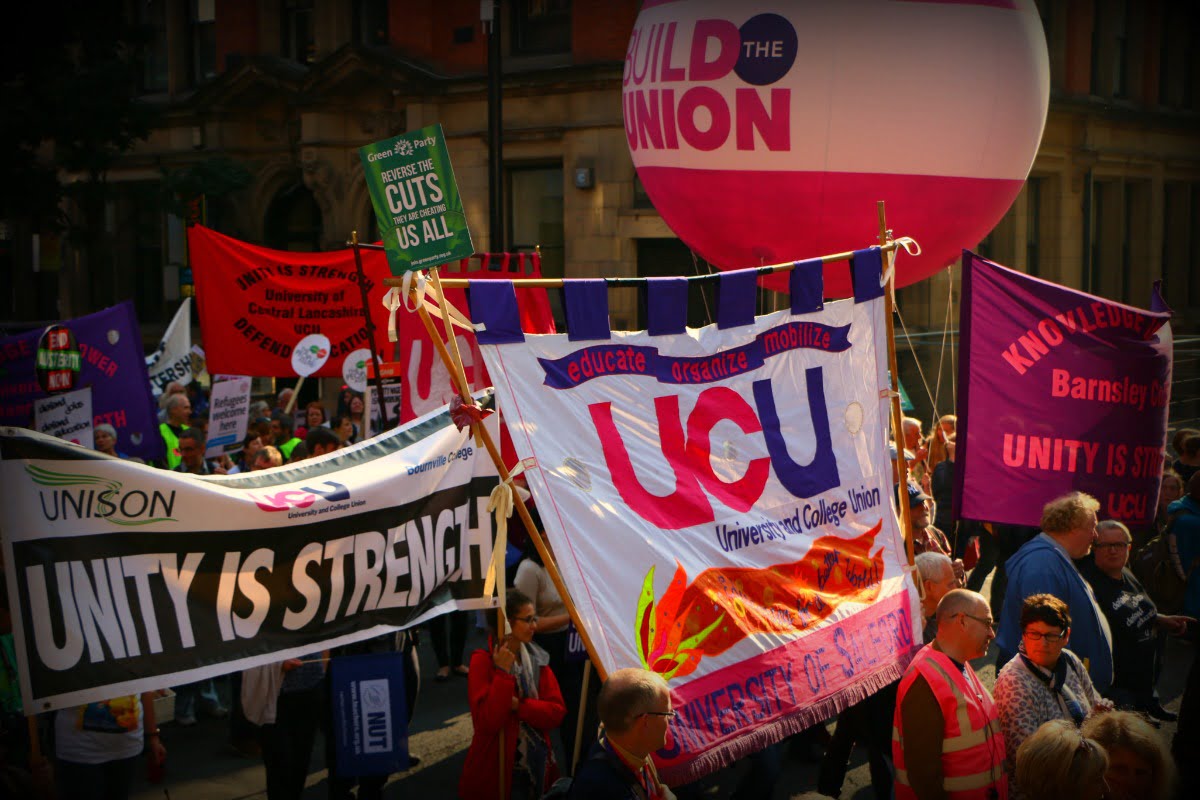Exploited lecturers and other university teaching staff are staging a two-day strike on 25-26th May, in protest against miserable pay conditions, rejecting an ‘insulting’ pay deal by university and college bosses. Joe Attard of Kings College London UCU branch (personal capacity) discusses the battle ahead for higher education staff and all those fighting against Tory cuts.
Exploited lecturers and other university teaching staff are staging a two-day strike on 25-26th May, in protest against miserable pay conditions, rejecting an ‘insulting’ pay deal by university and college bosses.
Members of the further education union, UCU, voted overwhelmingly in favour of industrial action, with two-thirds backing the proposed strike and three-quarters for ‘action short of a strike’. The ballot received a 35.5 per cent turn out (about 60,000 members).
The full walk-out will be followed by further industrial action in which staff will ‘work to contract’ – refusing to take on overtime or perform any of the additional, pastoral tasks that make up much of the working life of academics.
The timing of these strikes – which are set to coincide with summer exams – has been calculated to inflict maximum damage on the bosses’ representatives at the Universities and Colleges Employers’ Association, whose paltry offer of 1.1 per cent pay increase (below the rate of inflation as measured by the Retail Price Index) was roundly rejected by the UCU.
Noting the potential impact on students, UCU General Secretary Sally Hunt stated that staff have been left with “no alternative” but to down tools. She said, “A 1.1 per cent offer is an insult to the hard work and dedication of higher education staff…The ball is now in UCEA’s court, but the employers need to come back to the table with a much improved offer if they wish to avoid significant disruption to students in the coming months.”
These bold words demonstrate that pressure from below has forced the leadership of the UCU in a more assertive direction. In light of real-term pay cuts of almost 15 per cent in the last six years for frontline staff, versus a 14 per cent increase in average salaries for Vice-Chancellors, the union has been propelled into action by the outrage of its rank-and-file.
A series of FOI requests made by the UCU last year led to the publishing of a report in February that revealed the average salary of a vice-chancellor (£272,432), in addition to their average annual expenditure on flights (£8,560) and hotels (£2,990).
When you compare these galling revelations to the fact that around 60 per cent of university staff are employed on a ‘casual’ basis, 33 per cent barely make rent or mortgage payments, 36 per cent struggle with household bills and 17 per cent with affording food, it is no wonder that academics have declared: enough is enough!
The disparity in wages between university managers and front-line staff has seen academic institutions going out of their way to avoid spilling the beans over bosses’ salaries. King’s College London (whose Principle, Ed Byrne, enjoys a whopping annual income of £452,000) has racked up a £250,000 legal bill during an ultimately unsuccessful three-year legal battle to prevent the disclosure of the salaries and job titles of staff earning over £100,000.
At an information tribunal, Director of Finance at King’s College London, Stephen Large, argued that publishing the pay of top non-academic staff would lead to “difficult conversations” and “affect team dynamics”. When considered against the various ‘cost-cutting’ exercises by senior management at King’s in recent years, including redundancy programmes, vacancy freezes and cramming full-time academics into shared offices, Steve might just have a point!
The UCU maintains that the pay and privileges enjoyed by top brass proves that universities could easily afford to reinvest the exorbitant fees wrung out of students back into teaching. In fact, the union claims that a £1.9bn surplus exists in the higher education sector.
Indeed, a successful campaign by Graduate Teaching Assistants (PhD students who teach part-time) has just won a 20% pay increase for casualised academics at King’s College London (with the possibility of an even better offer still on the cards).The assertive tactics employed by this campaign – which was led by members of the Marxist Student Federation – show that universities absolutely do have cash in their coffers, but will only cough up fairer pay for teachers when faced with the threat of industrial action by a united front of militant workers.
The UCU’s strike action demonstrates the increasing militancy of the public sector, with the junior doctors still locked in battle with the Tories over Jeremy Hunt’s dangerous new contracts and the NUT preparing to ballot for strike action. The Tories have correctly intuited the danger of unified resistance across the public sector, the threat of which has already forced government U-Turns on disability benefits, the forced academisation of schools, and the exemption of universities from FOI requests.
The UCU’s strike, coupled with the BMA’s decision to foster links across the trades union movement, shows that a concerted fightback is brewing. Such a development has militant implications and the Tories are right to fear it. The UCU conference in June will need to build towards this and show that the May strikes are just the start of a concerted drive to defend jobs and conditions and take this system on for a fair deal. If public sector workers rose up as one against the bosses’ greed and government austerity, then nothing could stand in their way.
- Solidarity with striking university workers!
- For an education system free from capitalism and a socialist society fit for humanity!






